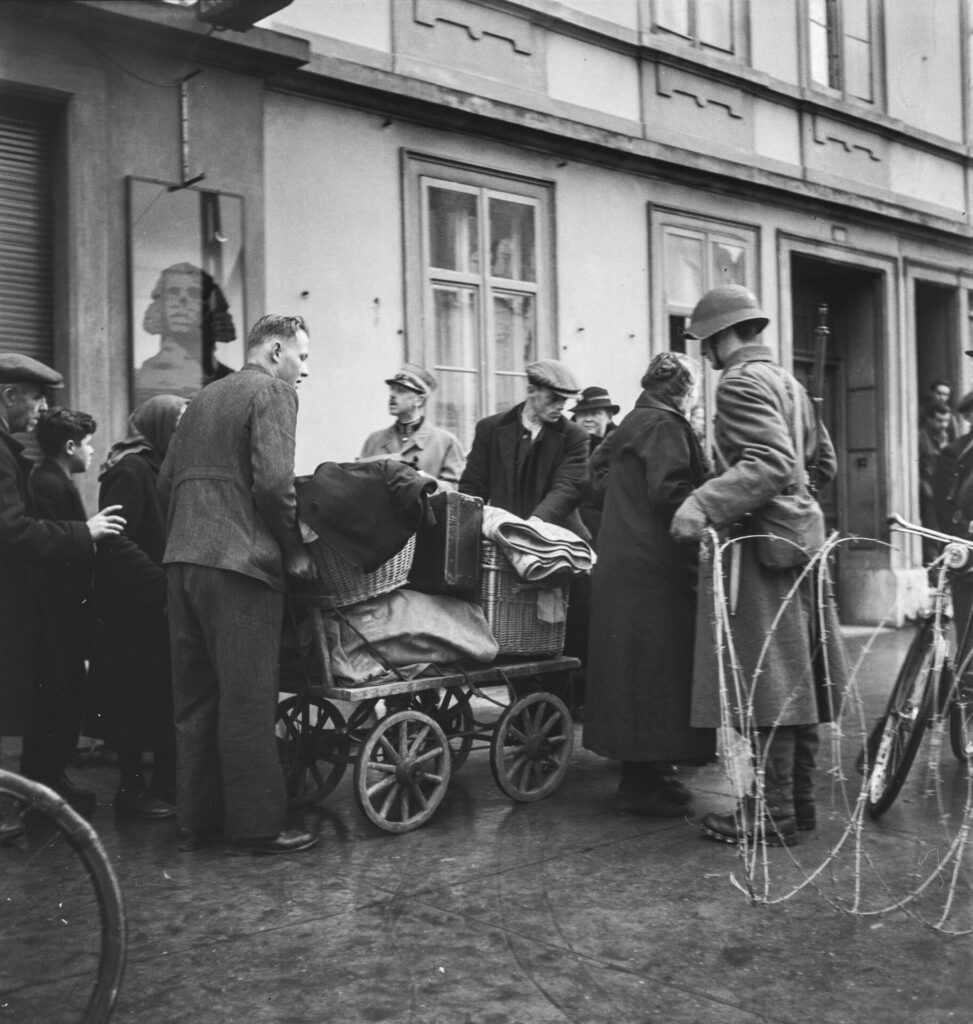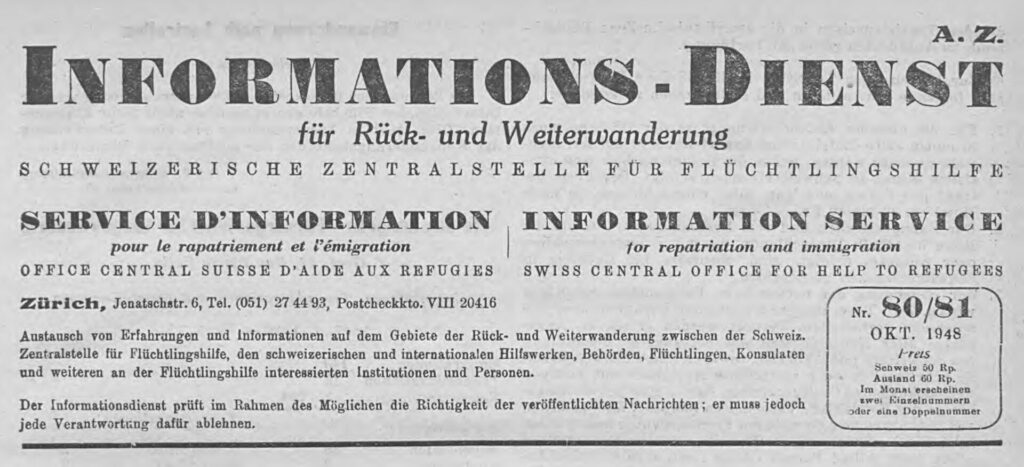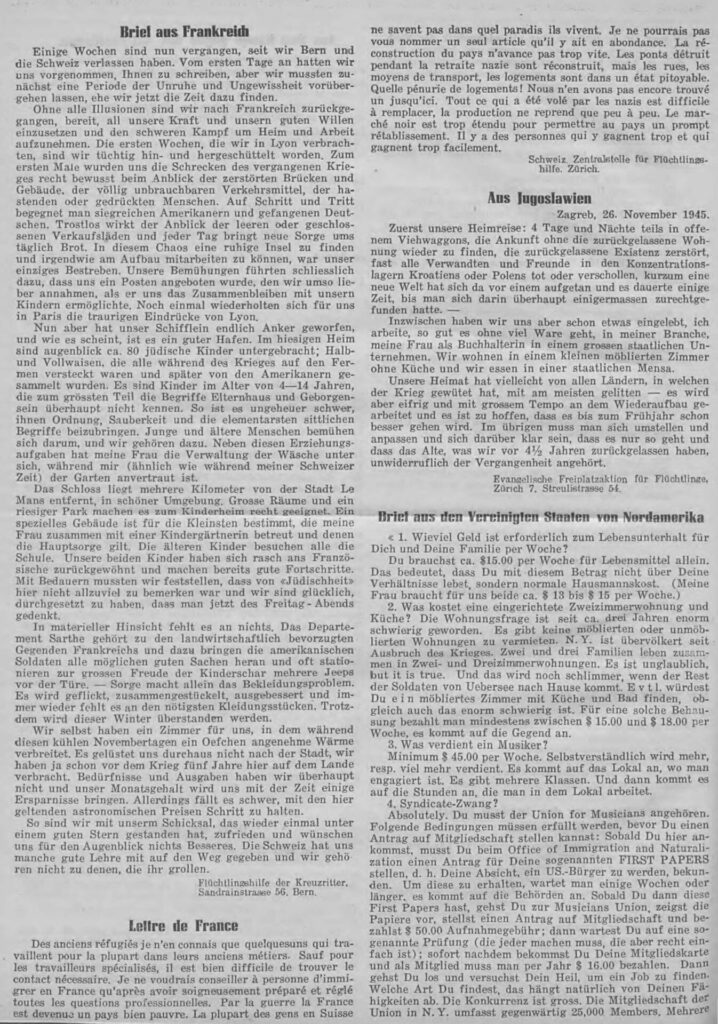Periodicals like newspapers, magazines, and bulletins thrived among refugee communities in the immediate postwar period. They served as an important means of cultural and national self-assertion after displacement, as Anna Holian has shown in the case of the Displaced Persons (DPs) in Germany.1 They often formed along national lines, (re)constructing the “imagined communities” lost or endangered due to the war by disseminating forms of cultural knowledge like customs, recipes, or stories. Another important—but maybe less considered—function of periodicals in the postwar context is that they also served as sites of knowledge production and dissemination about repatriation and asylum possibilities, conditions in countries of admission, as well as the migration process itself. Similar knowledge transfers had been taking place since 1933, especially among political exiles, who shared their experiences of potential escape routes and countries of asylum in refugee newspapers.2 In many ways, however, the immediate postwar period presented a new kind of challenge for displaced persons around the globe. The emerging international refugee regime was a complex and confusing place to navigate due to constantly changing definitions, organizations, and emigration possibilities. Destroyed or disrupted family ties only exacerbated the difficulty for refugees to use such channels for communication.
Conditions in Switzerland were no different. Although left unscathed by the hostilities owing to its neutrality, the country towards the end of the war saw the continuing presence and new arrival of large groups of displaced persons, despite its strict refugee regime aimed at reducing the country’s “foreign infiltration” (Überfremdung). Most refugees were obligated to leave the country at the earliest opportunity under the so-called principle of transit, according to which Switzerland was only supposed to serve as a stopover for them to plan their onward journeys.3 As elsewhere in Europe, a majority of refugees in Switzerland repatriated to their country of origin. A considerable number decided not to go back, however, for fear of anti-communist or antisemitic persecution or because there was simply nothing left of their home to go back to.

By the summer of 1947, many overseas countries had begun to open their borders, thus considerably expanding the emigration possibilities of displaced persons, including those in Switzerland. While some refugees were able to emigrate from Switzerland on their own, most participated in collective resettlement schemes organized by international relief organizations, like the International Refugee Organization (IRO), in accordance with the governments of the countries of admission. Apart from questions of eligibility (not everyone was entitled to international aid), receiving countries usually put forward a complex set of admission criteria to select what they deemed to be the most “useful” immigrants.4 Staying informed about the numerous schemes, organizations, criteria, and receiving countries was an often confusing and laborious task.
Under these circumstances, periodicals became an important source of knowledge for navigating the refugee regime on the national and international level. Due to the small size of the country, not many publications in Switzerland reached a high circulation or appeared regularly over a long period of time. One of the few that did (even abroad) was the Informationsdienst für Rück- und Weiterwanderung (Information Service for Repatriation and Immigration) published from July 1945 to March 1950 by the Swiss Central Office for Help to Refugees, the umbrella organization of the private aid agencies in Switzerland. It was edited by a group of refugees whose goal was to “contribute to understanding the situation of refugees and help them find their way back to a normal life, free from fear and hardship.”5 While the Informationsdienst, as indicated by its title, contained many forms of information, like news, job offers, timetables, and country profiles, it also printed letters written by refugees (usually anonymized) who had already left the country and wished to share their experience with those who had stayed behind. Through these letters, refugee communities distributed recently acquired experiential knowledge that helped subsequent refugees reduce uncertainty and make choices in transit. This custom was not dissimilar to the “epistolary practices” of migrant letters and newspapers of the nineteenth and early twentieth centuries.6

The ninth issue of the Informationsdienst, published in November 1945, was the first to feature a section of such letters. Beforehand, the editors had encouraged its readers to contribute their experiences to better adapt the periodical’s contents to the needs of the refugee readership. One letter, in particular, written by a refugee in transit from Barcelona to Venezuela, illustrates the type of knowledge disseminated therein. With almost no introduction, the letter launched into twenty-three bullet points about the refugee’s passage. It informed the readers, among other things, of routes to take, departure and arrival times of trains, what to expect from customs in Spain, and how much money to bring for food and tickets. Several points, however, were reserved for visa questions, such as points 3 and 22:
3. Spanish visa with residence permit for one month. (This is obtained immediately after telegraphic confirmation from the shipping company that passage has been paid for) […]
22. Then go to the English Consulate to ask for the Nevy Certy [Navigational Certificate]. Those traveling via Trinidad also need a transit visa. For Venezuela, you only require the Nevy Certy. It takes a week from here to request it by telegraph.7
This was no exception as many of the early issues, especially, revolved around the logistics of obtaining visas, including the time it took to request various forms and applications. Another letter in the same issue, also from Barcelona but by a Jewish refugee headed to Chile, mentioned the frustrations of regular delays and administrative hurdles. This writer recommended arriving in Barcelona well before the day of embarkation because there were “many things to be done” before that.8

Another recurring theme was the issue of money and, with it, that of job prospects and the housing situation. The person bound for Chile wrote about finding affordable accommodation with the help of the American Jewish Joint Distribution Committee. Regarding the availability of food and other necessary items, the letter continued: “Butter, eggs, cheese, meat etc. in abundance and whipped cream in every other shop. […] Shoes and clothes without tickets, suits a little cheaper than in Switzerland, shoes expensive.”9 Similarly, in one of the first letters from the United States, the writer creatively shared his knowledge about New York in the form of a list of questions with answers addressed directly to the readers:
1. How much money is needed to support you and your family per week?
You need about $15.00 per week for food alone. This means that you won't be living beyond your means, but on home cooking.
2. How much does a furnished two-room flat with kitchen cost?
The housing question has become enormously difficult in the last three years or so. […] And it will get worse when the rest of the soldiers come home from overseas. […] For such a dwelling you pay at least between $15.00 and $18.00 per week; it depends on the area.
3. What does a musician earn?
Minimum $45.00 per week. […] It depends on the venue where you are hired.10
Such indications of prices and wages were the most common information shared. Often, they appeared as lists of the cost of everyday items, like soap, gas, tools, or cigarettes. Other common motifs were those of the experience of arrival in a new country and of returning to an unrecognizable home. People who resettled overseas often wrote about their culture shock, the work ethic of the local population, food habits, and the hostilities they faced, sometimes even from prior refugee groups, when competing for jobs. The most common advice was, unsurprisingly, to learn the local language. There were also frequent remarks on the challenges of the local climate, as in the following letter from Venezuela:
As a European, it takes some time to get used to the climate here; there are all kinds of symptoms, such as fever, dysentery, headaches etc. Life is very expensive here. For those who want to immigrate, I can only advise them to acquire a good knowledge of Spanish because coming here without a basic grasp of the language, without major financial resources and without friends, is very risky.11
Compared to the often very methodical but impersonal letters regarding visa logistics or pricing, these passages about the experience of a new beginning in a foreign or estranged land allow glimpses into the emotional world of these people. This holds especially true for many of the letters by people who repatriated. A couple that had gone back to France in the Fall of 1945, for example, mentioned a “period of restlessness and uncertainty” they had to pass through before being able to write back.12 They recounted their arrival, the remnants of the war they encountered, the closed shops, destroyed bridges, and broken people. A Jewish refugee from Yugoslavia wrote about having to find out upon his return that most of his family had been murdered in a concentration camp in Poland. The only way forward, he advised, was for people to accept their loss and focus on rebuilding their home: “[O]ne has to change and adapt and realize that this is the only way and that the old world we left behind 4.5 years ago, is irrevocably a thing of the past.”13
These themes did not always stand apart but could often be found juxtaposed in a single letter. Whether for lack of space or a pragmatic attitude, many letters were efficiently structured and contained as much information as possible. This might explain the fact that most letters focused on very practical issues, while only few letters offered a more “moral” or emotional kind of support. Nevertheless, passing on one’s experiential knowledge via newspaper letters to help fellow refugees in transit navigate the fast-changing refugee regimes during the immediate postwar period constituted an act of anonymized solidarity. Besides being an important form of migrant knowledge production and exchange, the Informationsdienst also facilitated the continuation and development of the “epistolary practices” of refugees of the 1930s and early 1940s, which had helped people escape from fascist persecution. Their resemblance, especially those from overseas, to more conventional migrant letters from the nineteenth and twentieth centuries, furthermore, illustrates the peculiar position these people found themselves in as refugees in the eyes of international relief organizations but voluntary migrants in the eyes of many of their host countries.

Ramon Wiederkehr is a PhD student and assistant at the Chair for Contemporary History at the University of Neuchâtel. His dissertation research focuses on the entangled history of Switzerland and the international refugee regime in the wake of the Second World War from an actor-centered perspective.
- Anna Holian, Between National Socialism and Soviet Communism: Displaced Persons in Postwar Germany (Ann Arbor: University of Michigan Press, 2011), 87, 156. ↩︎
- Swen Steinberg, “Knowledge from Five Continents: Escape Destinations in Publications of German-Speaking Political Refugees, 1933–1940,” in Cultural Translation and Knowledge Transfer on Alternative Routes of Escape from Nazi Terror: Mediations Through Migrations, ed. S. Korbel and P. Strobl, 49–65 (London: Routledge, 2021). ↩︎
- Simon Erlanger, “Nur ein Durchgangsland”: Arbeitslager und Internierungsheime für Flüchtlinge und Emigranten in der Schweiz 1940–1949 (Zurich: Chronos, 2006), 186. ↩︎
- G. Daniel Cohen, In War’s Wake: Europe’s Displaced Persons in the Postwar Order (Oxford: Oxford University Press, 2012), 114. ↩︎
- All citations are translated from German by the author. See “An die Leser,” Informationsdienst für Rück- und Weiterwanderung 24, June 1946, 1. ↩︎
- Bruce S. Elliot et al., Introduction, in Letters Across Borders: The Epistolary Practices of International Migrants, ed. idem et al., 1–25 (New York: Palgrave, 2006). ↩︎
- “Brief aus Barcelona eines Venezuelafahrers,”Informationsdienst für Rück- und Weiterwanderung 9, November 1945, AfZ, 11. ↩︎
- “Ein Chile-Fahrer schreibt uns aus Barcelona,” Informationsdienst für Rück- und Weiterwanderung 9, November 1945, AfZ, 10. ↩︎
- Ibid., 10. ↩︎
- “Brief aus den Vereinigten Staaten von Nordamerika,” Informationsdienst für Rück- und Weiterwanderung 11/12, AfZ, 17. ↩︎
- “Venezuela,” Informationsdienst für Rück- und Weiterwanderung 80/81, AfZ, 10. ↩︎
- “Brief aus Frankreich,” Informationsdienst für Rück- und Weiterwanderung 11/12, AfZ, 16. ↩︎
- “Aus Jugoslawien,” Informationsdienst für Rück- und Weiterwanderung 11/12, AfZ, 16. ↩︎
